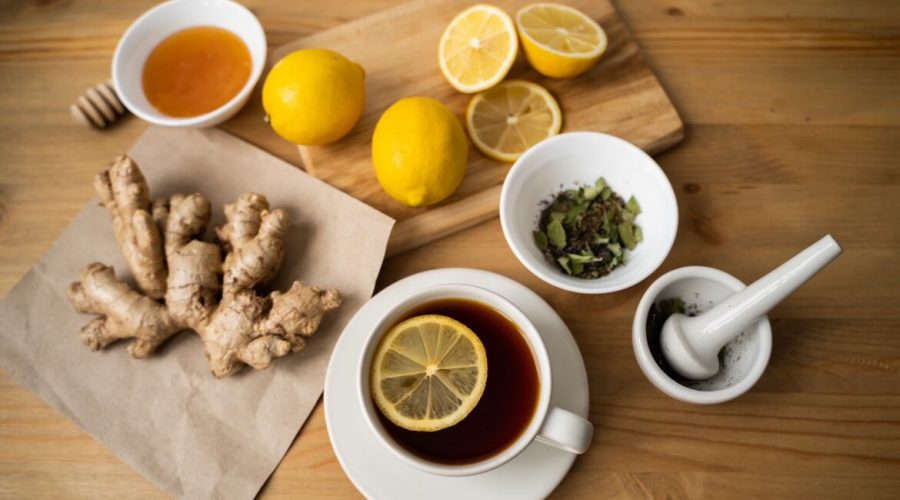There’s nothing fun about being struck down with a respiratory tract infection. Coughing, congestion, sinus headaches, and a scratchy throat make you feel miserable and unable to focus on anything else.
Unless you develop a secondary bacterial infection, antibiotics are not appropriate for treating colds and flu. And over-the-counter or prescription cold medications often come with side effects. That’s why more people are turning towards complementary and alternative medicine (CAM) to support the body’s healing capacity.
We’ve compiled a list of the 8 best evidence-based herbal remedies to help alleviate symptoms and speed up your recovery. Some of them may already be in your home!

1. Echinacea
Also known as purple coneflower, Echinacea Purpurea is a flowering herb native to North America that’s used around the world for relieving colds and flu. You’ve probably seen this herbal extract at your local health store or pharmacy as it’s a popular Western Herbal Medicine.
It’s packed with active compounds like flavonoids and polysaccharides, which give it potent antioxidant, anti-inflammatory, antiviral, and immune-stimulating properties. Research suggests Echinacea supports white blood cell activity and may reduce the incidence and severity of colds and other respiratory tract infections (1).
How to Take It: Echinacea extract is available in capsule, tincture, and tea form, making it easy to add to your daily routine. Herbalists recommend taking Echinacea as a prophylactic when you think you’re at risk.
If you’ve already come down with a bug, take 1000-4000 mg daily in divided doses as soon as you feel the symptoms start. Additionally, research suggests 5-6 cups of Echinacea tea per day may help to relieve symptoms (2). However, it should be used over the short-term – no longer than 2 weeks at a time.
2. Andrographis
Andrographis should be in everyone’s natural medicine cabinet! Native to India, Andrographis is often known as “Indian Echinacea” and has a history of use in Traditional Ayurvedic Medicine for treating colds and flu.
A study on adults with an upper respiratory tract infection in the International Journal of Phytotherapy and Phytopharmacology found Andrographis extract shortened the duration of cold symptoms (3).
How to Take It: There is no standard recommended dosage, but studies show 200 mg of Andrographis extract daily is an effective dose. Just make sure to take the herb at the first sign of symptoms!
3. Liquorice Root
Sweet, anise-scented liquorice root (Glycyrrhiza glabra) is a fantastic natural remedy to keep on hand when you’re struggling with a cough or sore throat. It’s packed with anti-inflammatory, antiviral, and antimicrobial compounds. Plus, it has natural expectorant and antispasmodic properties – making it ideal for anyone struggling with cold or flu symptoms (4).
How to Take It: Liquorice root comes in the form of herbal tea, tincture, capsule, cough syrup, and lozenges. While there are no dosage guidelines for this herbal remedy, herbalists suggest taking 1-4 g of standardized liquorice root in divided doses during the day. Sipping on a cup of liquorice tea a few times per day may also provide relief from symptoms. However, it should only be taken short-term.
If you have high blood pressure or are pregnant, please speak to your doctor before taking liquorice extract.
4. Raw Honey
Honey is not just a healthy sweetener; in its raw, unheated form honey is a fantastic immune booster thanks to its natural antimicrobial properties. It also coats inflamed mucous membranes in the respiratory tract, helping to relieve sore throats and coughs.
How to Take It: To make a soothing drink, add 1-2 teaspoons of raw honey to 1 cup of hot water along with a slice of lemon. This helps you stay hydrated and may ease your symptoms.
5. Ginger
Ginger root is a popular culinary spice with a potent, spicy flavour. Its medicinal properties are often overlooked, but fresh ginger root contains bioactive anti-inflammatory and antiviral compounds called gingerols. It has been used in Traditional Chinese and Indian Medicine for centuries to help with colds, flu, and fevers.
How to Take It: At the first sign of symptoms, add a few slices of ginger root to a cup of hot water and let it steep for 10 minutes. You can enhance the benefits of ginger by adding a teaspoon of raw honey and a squeeze of lemon.
6. American Ginseng
When it comes to reducing the symptoms of colds and flu, American ginseng (Panax quinquefolius) has some impressive research behind it. As the name suggests, this herb is native to North America where it was discovered and used as a health tonic by Native American tribes. It contains bioactive ginsenosides that have antioxidant, anti-inflammatory, and immune-supportive effects.
A review in the Journal of Evidence-Based Complementary and Alternative Medicine found that American ginseng may reduce the duration of colds and acute respiratory infections by up to 6 days (5). Additionally, American ginseng has adaptogenic properties, meaning it may help if you’re run down and picking up infections due to chronic stress.
How to Take It: Research suggests American ginseng is best when taken preventatively. Doses of 400-800 mg daily have been studied to reduce symptoms of colds and other respiratory tract infections.
7. Marshmallow Root
If your throat feels dry, scratchy, or inflamed from frequent coughing, marshmallow root is a must-have! Marshmallow root, from the Althaea officinalis herb, is a wonderful natural remedy for soothing respiratory tract and digestive symptoms. It contains a soft fibre called mucilage, which creates a protective coating in the throat to ease irritation and inflammation. Research has shown consuming marshmallow root may reduce a dry cough in as little as 10 minutes (6).
How to Take It: Marshmallow root is widely available in the form of dried herbs, tea, lozenges, or capsules. Regularly sucking on lozenges or sipping on marshmallow root tea is soothing when you have a cold, cough, or sore throat.
8. Eucalyptus Essential Oil
Eucalyptus essential oil has an unmistakable, refreshing aroma that may break up mucus and help you breathe easier! Extracted from the leaves of the Australian blue gum tree, it’s a natural antispasmodic, decongestant, expectorant, and bronchodilator. When inhaled and applied topically, eucalyptus oil helps to relieve coughs, congestion, sinusitis, and chest tightness. In doing so, it helps you get some much-needed sleep to support healing!
Topical Use: Dilute 5 drops of eucalyptus oil in 1 teaspoon of carrier oil (such as almond, sesame, or jojoba oil) and massage onto the chest and upper back to ease congestion and chest tightness. You can also add 10 drops to a bath and soak to ease body aches and cool the body down.
Aromatic Use: Add 5 drops to a small bowl of boiling water and inhale the vapours to clear congestion and headaches.
Please note: eucalyptus oil shouldn’t be consumed orally.
Final Thoughts
In summary, 8 herbal remedies for reducing the symptoms of colds, flu, and coughs include:
- Echinacea
- Andrographis
- Honey
- Ginger
- Liquorice root
- American Ginseng
- Marshmallow Root Tea
- Eucalyptus Essential Oil
Additionally, getting plenty of rest, staying hydrated, and upping your consumption of vitamin C-rich fruits and vegetables will help your body recover faster!
Take note: if respiratory symptoms last for longer than a week or start becoming worse, please consult your doctor.
Other herbal remedy guides
7 Top Herbal Remedies For Anxiety And Stress
11 Popular Ayurvedic Herbs You Should Try
8 Popular Herbs in Chinese Medicine You Should Try
Resources
- https://www.ncbi.nlm.nih.gov/books/NBK74094/?report=reader
- https://pubmed.ncbi.nlm.nih.gov/10976979/
- https://pubmed.ncbi.nlm.nih.gov/20092985/
- https://www.ncbi.nlm.nih.gov/pmc/articles/PMC7167772
- https://www.hindawi.com/journals/ecam/2011/282151/
- https://www.karger.com/Article/Pdf/489560
DISCLAIMER: The Site cannot and does not contain medical / health advice. The medical / health information is provided for general informational and educational purposes only and is not a substitute for professional advice. Accordingly, before seeking any form of medical advice, diagnoses or treatment based upon such information, we encourage you to consult with your GP or other qualified health practitioner. You must never disregard professional medical advice or delay in seeking it because of something mentioned on this Site. The use or reliance of any information contained on the site is solely at your own risk.



